一般将来时练习及答案
- 格式:doc
- 大小:43.00 KB
- 文档页数:6
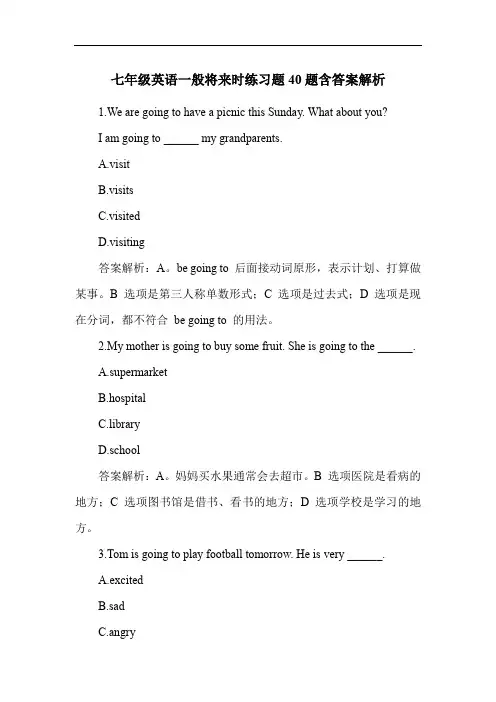
七年级英语一般将来时练习题40题含答案解析1.We are going to have a picnic this Sunday. What about you?I am going to ______ my grandparents.A.visitB.visitsC.visitedD.visiting答案解析:A。
be going to 后面接动词原形,表示计划、打算做某事。
B 选项是第三人称单数形式;C 选项是过去式;D 选项是现在分词,都不符合be going to 的用法。
2.My mother is going to buy some fruit. She is going to the ______.A.supermarketB.hospitalC.libraryD.school答案解析:A。
妈妈买水果通常会去超市。
B 选项医院是看病的地方;C 选项图书馆是借书、看书的地方;D 选项学校是学习的地方。
3.Tom is going to play football tomorrow. He is very ______.A.excitedB.sadC.angryD.tired答案解析:A。
要去踢足球通常会很兴奋。
B 选项悲伤;C 选项生气;D 选项累,都不符合语境。
4.We are going to have an English test next week. I am going to study ______.A.hardB.hardlyzyzily答案解析:A。
study hard 努力学习。
B 选项hardly 是几乎不的意思;C 选项lazy 是懒惰的;D 选项lazily 是懒惰地,都不符合语境。
5.My sister is going to be a doctor. She is going to study ______.A.mathB.scienceC.artD.music答案解析:B。
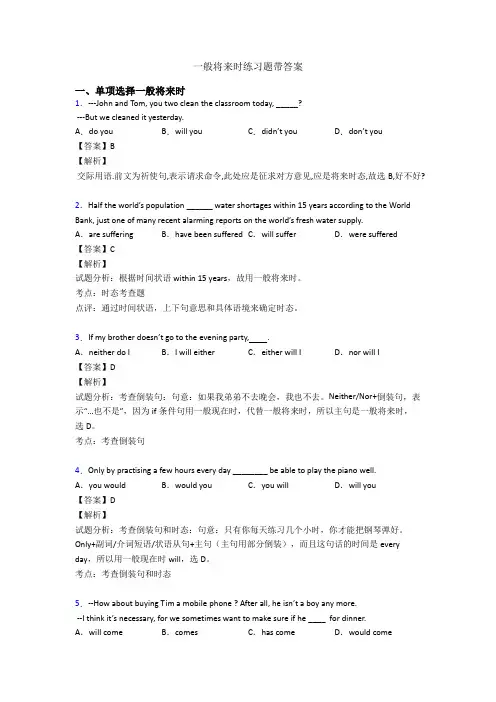
一般将来时练习题带答案一、单项选择一般将来时1.---John and Tom, you two clean the classroom today, _____?---But we cleaned it yesterday.A.do you B.will you C.didn’t you D.don’t you【答案】B【解析】交际用语.前文为祈使句,表示请求命令,此处应是征求对方意见,应是将来时态,故选B,好不好?2.Half the world’s population ______ water shortages within 15 years according to the World Bank, just one of many recent alarming reports on the world’s fresh water supply.A.are suffering B.have been suffered C.will suffer D.were suffered【答案】C【解析】试题分析:根据时间状语within 15 years,故用一般将来时。
考点:时态考查题点评:通过时间状语,上下句意思和具体语境来确定时态。
3.If my brother doesn’t go to the evening party, .A.neither do I B.I will either C.either will I D.nor will I【答案】D【解析】试题分析:考查倒装句:句意:如果我弟弟不去晚会,我也不去。
Neither/Nor+倒装句,表示“…也不是”,因为if条件句用一般现在时,代替一般将来时,所以主句是一般将来时,选D。
考点:考查倒装句4.Only by practising a few hours every day ________ be able to play the piano well.A.you would B.would you C.you will D.will you【答案】D【解析】试题分析:考查倒装句和时态:句意:只有你每天练习几个小时,你才能把钢琴弹好。
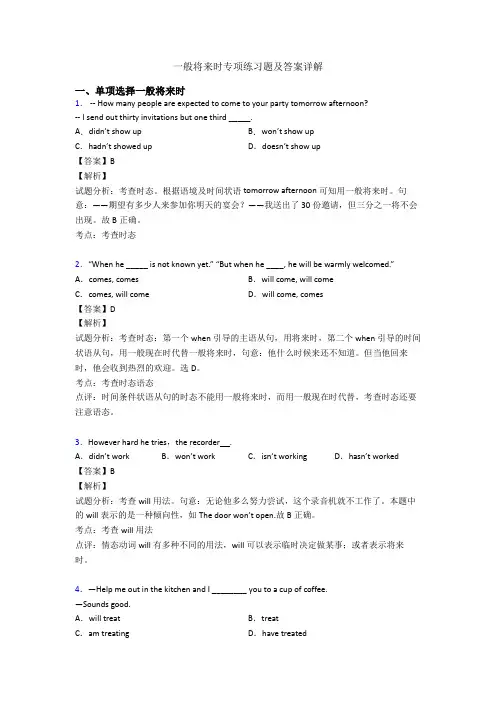
一般将来时专项练习题及答案详解一、单项选择一般将来时1. -- How many people are expected to come to your party tomorrow afternoon?-- I send out thirty invitations but one third _____.A.didn’t show up B.won’t show upC.hadn’t showed up D.doesn’t show up【答案】B【解析】试题分析:考查时态。
根据语境及时间状语tomorrow afternoon可知用一般将来时。
句意:——期望有多少人来参加你明天的宴会?——我送出了30份邀请,但三分之一将不会出现。
故B正确。
考点:考查时态2.“When he _____ is not known yet.” “But when he ____, he will be warmly welcomed.”A.comes, comes B.will come, will comeC.comes, will come D.will come, comes【答案】D【解析】试题分析:考查时态:第一个when引导的主语从句,用将来时,第二个when引导的时间状语从句,用一般现在时代替一般将来时,句意:他什么时候来还不知道。
但当他回来时,他会收到热烈的欢迎。
选D。
考点:考查时态语态点评:时间条件状语从句的时态不能用一般将来时,而用一般现在时代替,考查时态还要注意语态。
3.However hard he tries,the recorder .A.didn’t work B.won’t work C.isn’t working D.hasn’t work ed【答案】B【解析】试题分析:考查will用法。
句意:无论他多么努力尝试,这个录音机就不工作了。
本题中的will表示的是一种倾向性,如The door won’t open.故B正确。
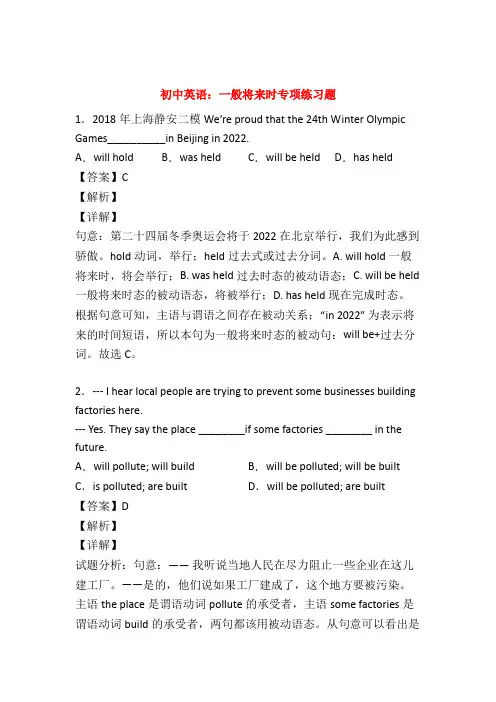
初中英语:一般将来时专项练习题1.2018年上海静安二模We’re proud that the 24th Winter Olympic Games__________in Beijing in 2022.A.will hold B.was held C.will be held D.has held 【答案】C【解析】【详解】句意:第二十四届冬季奥运会将于2022在北京举行,我们为此感到骄傲。
hold动词,举行;held过去式或过去分词。
A. will hold一般将来时,将会举行;B. was held过去时态的被动语态;C. will be held 一般将来时态的被动语态,将被举行;D. has held现在完成时态。
根据句意可知,主语与谓语之间存在被动关系;“in 2022” 为表示将来的时间短语,所以本句为一般将来时态的被动句:will be+过去分词。
故选C。
2.--- I hear local people are trying to prevent some businesses building factories here.--- Yes. They say the place ________if some factories ________ in the future.A.will pollute; will build B.will be polluted; will be built C.is polluted; are built D.will be polluted; are built【答案】D【解析】【详解】试题分析:句意:―― 我听说当地人民在尽力阻止一些企业在这儿建工厂。
――是的,他们说如果工厂建成了,这个地方要被污染。
主语the place是谓语动词pollute的承受者,主语some factories是谓语动词build的承受者,两句都该用被动语态。
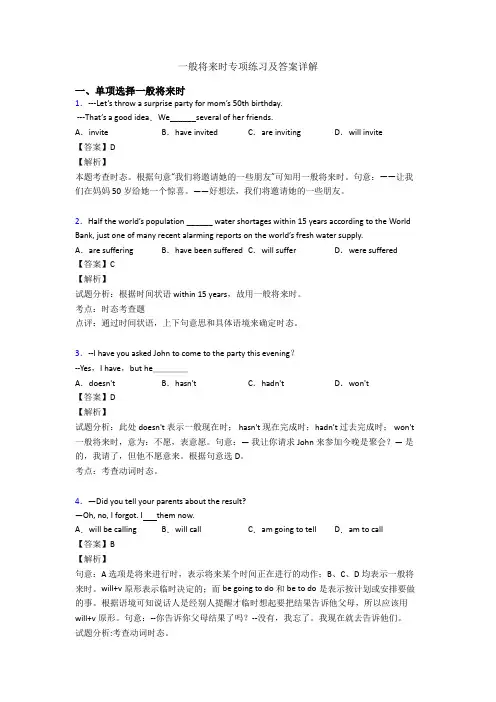
一般将来时专项练习及答案详解一、单项选择一般将来时1.---Let’s throw a surprise party for mom’s 50th birthday.---That’s a good idea.We______several of her friends.A.invite B.have invited C.are inviting D.will invite【答案】D【解析】本题考查时态。
根据句意“我们将邀请她的一些朋友”可知用一般将来时。
句意:——让我们在妈妈50岁给她一个惊喜。
——好想法,我们将邀请她的一些朋友。
2.Half the world’s population ______ water shortages within 15 years according to the World Bank, just one of many recent alarming reports on the world’s fresh water supply.A.are suffering B.have been suffered C.will suffer D.were suffered 【答案】C【解析】试题分析:根据时间状语within 15 years,故用一般将来时。
考点:时态考查题点评:通过时间状语,上下句意思和具体语境来确定时态。
3.--I have you asked John to come to the party this evening?--Yes,I have,but he____A.doesn't B.hasn't C.hadn't D.won't【答案】D【解析】试题分析:此处doesn't 表示一般现在时; hasn't 现在完成时;hadn't 过去完成时; won't 一般将来时,意为:不愿,表意愿。
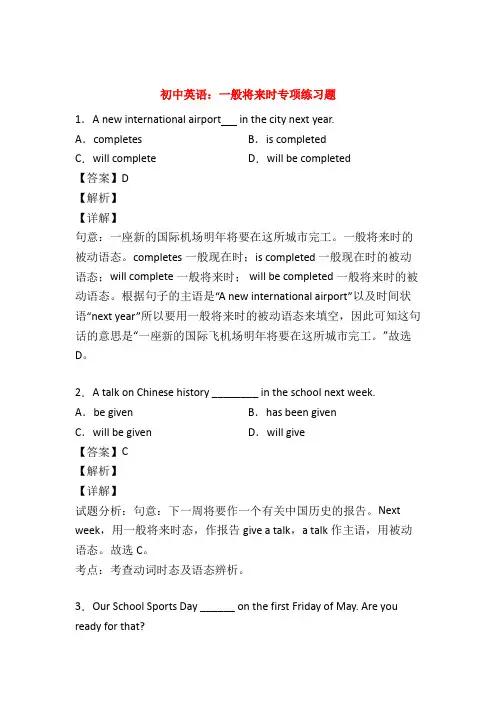
初中英语:一般将来时专项练习题1.A new international airport in the city next year. A.completes B.is completedC.will complete D.will be completed【答案】D【解析】【详解】句意:一座新的国际机场明年将要在这所城市完工。
一般将来时的被动语态。
completes一般现在时;is completed 一般现在时的被动语态;will complete一般将来时; will be completed一般将来时的被动语态。
根据句子的主语是“A new international airport”以及时间状语“next year”所以要用一般将来时的被动语态来填空,因此可知这句话的意思是“一座新的国际飞机场明年将要在这所城市完工。
”故选D。
2.A talk on Chinese history ________ in the school next week.A.be given B.has been givenC.will be given D.will give【答案】C【解析】【详解】试题分析:句意:下一周将要作一个有关中国历史的报告。
Next week,用一般将来时态,作报告give a talk,a talk作主语,用被动语态。
故选C。
考点:考查动词时态及语态辨析。
3.Our School Sports Day ______ on the first Friday of May. Are you ready for that?A.held B.is held C.will be held D.has held【答案】C【解析】【详解】句意:我们学校的体育日将在五月的第一个星期五举行。
你准备好了吗?考查动词的被动语态。
held过去式或过去分词;is held一般现在时态的被动语态;will be held一般将来时态的被动语态;has held现在完成时态。
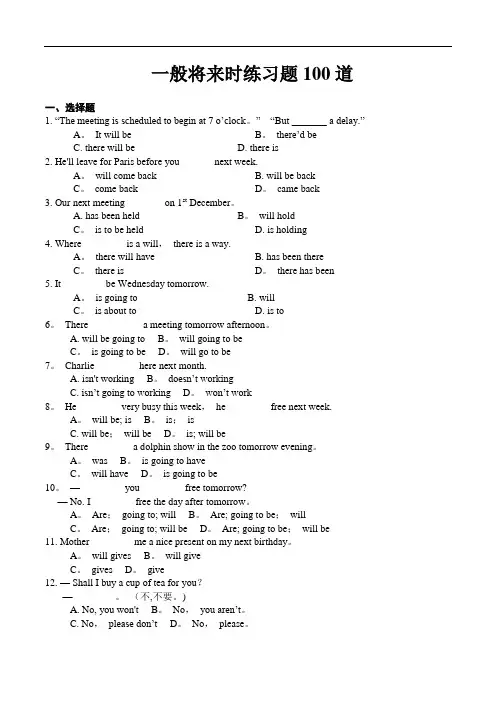
一般将来时练习题100道一、选择题1. “The meeting is scheduled to begin at 7 o’clock。
”“But _______ a delay.”A。
It will be B。
there’d beC. there will beD. there is2. He'll leave for Paris before you ______ next week.A。
will come back B. will be backC。
come back D。
came back3. Our next meeting _______ on 1st December。
A. has been held B。
will holdC。
is to be held D. is holding4. Where ________ is a will,there is a way.A。
there will have B. has been thereC。
there is D。
there has been5. It ________ be Wednesday tomorrow.A。
is going to B. willC。
is about to D. is to6。
There __________ a meeting tomorrow afternoon。
A. will be going to B。
will going to beC。
is going to be D。
will go to be7。
Charlie ________ here next month.A. isn't working B。
doesn’t workingC. isn’t going to working D。
won’t work8。
He ________ very busy this week,he ________ free next week.A。
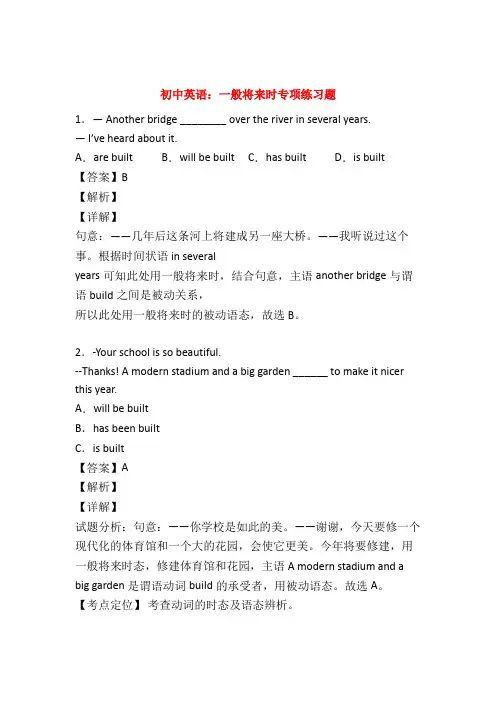
初中英语:一般将来时专项练习题1.— Another bridge ________ over the river in several years.—I’ve heard about it.A.are built B.will be built C.has built D.is built【答案】B【解析】【详解】句意:——几年后这条河上将建成另一座大桥。
——我听说过这个事。
根据时间状语in severalyears可知此处用一般将来时,结合句意,主语another bridge与谓语build之间是被动关系,所以此处用一般将来时的被动语态,故选B。
2.-Your school is so beautiful.--Thanks! A modern stadium and a big garden ______ to make it nicer this year.A.will be builtB.has been builtC.is built【答案】A【解析】【详解】试题分析:句意:――你学校是如此的美。
――谢谢,今天要修一个现代化的体育馆和一个大的花园,会使它更美。
今年将要修建,用一般将来时态,修建体育馆和花园,主语A modern stadium and a big garden是谓语动词build的承受者,用被动语态。
故选A。
【考点定位】考查动词的时态及语态辨析。
3.---China plans to send another spaceship into space.---Wow! More and more secrets _____soon.A.are going to discoverB.will be discoveredC.have discovered【答案】B【解析】【详解】句意:——中国计划再发射一艘宇宙飞船进入太空。
——哇!越来越多的秘密很快就会被发现。
A. are going to discover一般将来时的主动语态;B. will be discovered 一般将来时的被动语态;C. have discovered现在完成时的主动语态。
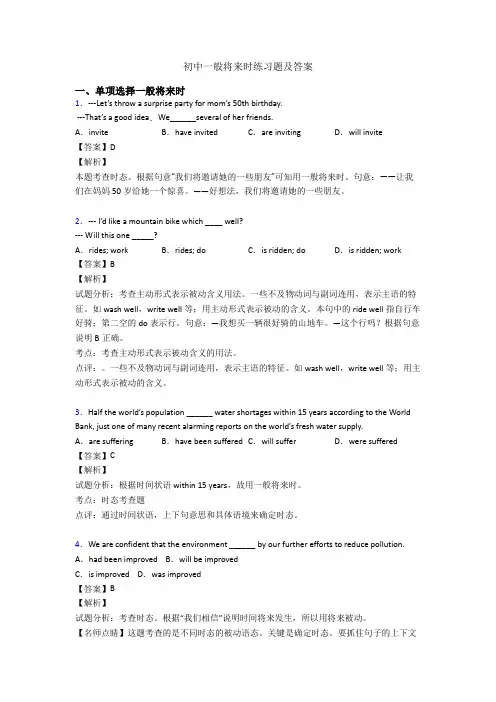
初中一般将来时练习题及答案一、单项选择一般将来时1.---Let’s throw a surprise party for mom’s 50th birthday.---That’s a good idea.We______several of her friends.A.invite B.have invited C.are inviting D.will invite【答案】D【解析】本题考查时态。
根据句意“我们将邀请她的一些朋友”可知用一般将来时。
句意:——让我们在妈妈50岁给她一个惊喜。
——好想法,我们将邀请她的一些朋友。
2.--- I’d like a mountain bike which ____ well?--- Will this one _____?A.rides; work B.rides; do C.is ridden; do D.is ridden; work【答案】B【解析】试题分析:考查主动形式表示被动含义用法。
一些不及物动词与副词连用,表示主语的特征。
如wash well,write well等;用主动形式表示被动的含义。
本句中的ride well指自行车好骑;第二空的do表示行。
句意:—我想买一辆很好骑的山地车。
—这个行吗?根据句意说明B正确。
考点:考查主动形式表示被动含义的用法。
点评:。
一些不及物动词与副词连用,表示主语的特征。
如wash well,write well等;用主动形式表示被动的含义。
3.Half the world’s population ______ water shortages within 15 years according to the World Bank, just one of many recent alarming reports on the world’s fresh water supply.A.are suffering B.have been suffered C.will suffer D.were suffered【答案】C【解析】试题分析:根据时间状语within 15 years,故用一般将来时。
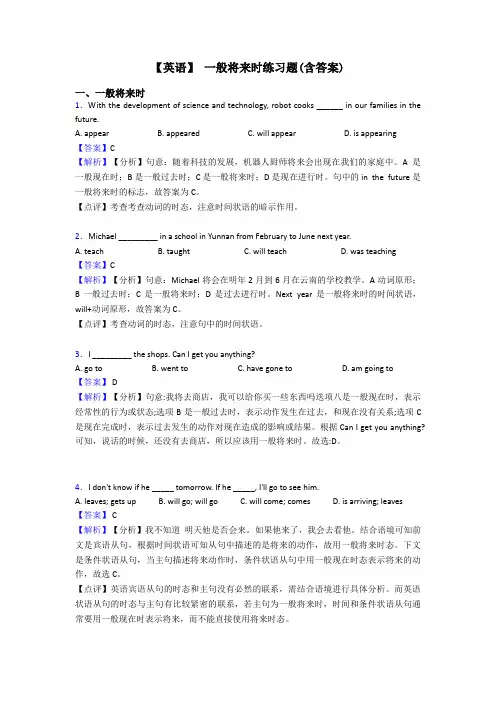
【英语】一般将来时练习题(含答案)一、一般将来时1.With the development of science and technology, robot cooks ______ in our families in the future.A. appearB. appearedC. will appearD. is appearing【答案】C【解析】【分析】句意:随着科技的发展,机器人厨师将来会出现在我们的家庭中。
A是一般现在时;B是一般过去时;C是一般将来时;D是现在进行时。
句中的in the future是一般将来时的标志,故答案为C。
【点评】考查考查动词的时态,注意时间状语的暗示作用。
2.Michael _________ in a school in Yunnan from February to June next year.A. teachB. taughtC. will teachD. was teaching【答案】C【解析】【分析】句意:Michael将会在明年2月到6月在云南的学校教学。
A动词原形;B一般过去时;C是一般将来时;D是过去进行时。
Next year是一般将来时的时间状语,will+动词原形,故答案为C。
【点评】考查动词的时态,注意句中的时间状语。
3.I _________ the shops. Can I get you anything?A. go toB. went toC. have gone toD. am going to【答案】 D【解析】【分析】句意:我将去商店,我可以给你买一些东西吗迭项八是一般现在时,表示经常性的行为或状态;选项B是一般过去时,表示动作发生在过去,和现在没有关系;选项C 是现在完成时,表示过去发生的动作对现在造成的影响或结果。
根据Can I get you anything?可知,说话的时候,还没有去商店,所以应该用一般将来时。
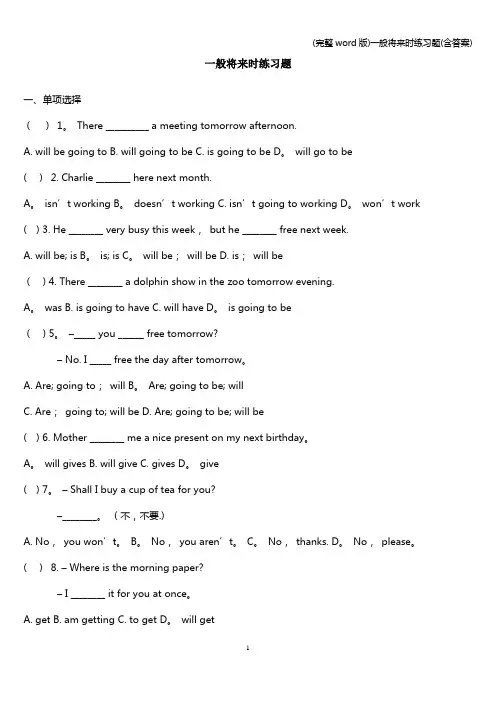
一般将来时练习题一、单项选择()1。
There __________ a meeting tomorrow afternoon.A. will be going toB. will going to beC. is going to be D。
will go to be( )2. Charlie ________ here next month.A。
isn’t working B。
doesn’t working C. isn’t going to working D。
won’t work ( ) 3. He ________ very busy this week,but he ________ free next week.A. will be; is B。
is; is C。
will be;will be D. is;will be() 4. There ________ a dolphin show in the zoo tomorrow evening.A。
was B. is going to have C. will have D。
is going to be() 5。
–_____ you ______ free tomorrow?– No. I _____ free the day after tomorrow。
A. Are; going to;will B。
Are; going to be; willC. Are;going to; will beD. Are; going to be; will be( ) 6. Mother ________ me a nice present on my next birthday。
A。
will gives B. will give C. gives D。
give( ) 7。
– Shall I buy a cup of tea for you?–________。
七年级英语一般将来时练习题40题【含答案解析】1. There ______ a basketball game in our school tomorrow.A. will haveB. is going to haveC. will beD. is going to has答案:C。
解析:一般将来时常见的表达结构有两种,一是will+动词原形,二是be going to+动词原形。
这里表示存在有一场篮球比赛,要用there be句型,其将来时形式为there will be或者there is/are going to be。
选项A和B中have表示拥有,不能用于there be句型。
选项D结构错误。
2. We ______ an English test next week.A. haveB. will haveC. hadD. are having答案:B。
解析:根据next week可知要用一般将来时。
一般将来时结构为will+动词原形或者be going to+动词原形。
选项A是一般现在时;选项C是一般过去时;选项D是现在进行时表示将来,但是这里没有表示计划好的语境,所以要用will have。
3. Our teacher ______ us to the park for a picnic this Sunday.A. will takeB. takesC. tookD. is taking答案:A。
解析:this Sunday表示将来的时间,句子要用一般将来时。
一般将来时结构为will+动词原形或者be going to+动词原形。
选项B是一般现在时;选项C是一般过去时;选项D是现在进行时表示将来,这里没有强调计划安排好的语境,所以用will take。
4. She ______ her homework after school tomorrow.A. will doB. doesC. didD. is doing答案:A。
一般将来时练习题(含答案)经典一、一般将来时1.— I hear Leo will leave for Korea for a meeting.— Really? Do you know when he _______.A. will startB. to startC. started【答案】 A【解析】【分析】句意:——我听说Leo要去韩国开会。
——真的吗?你知道他什么时候出发吗?when何时,此处询问将来的时间,故用一般将来时,因此选A。
【点评】考查动词的时态。
2.I don't know whether mom _________ me to Beijing next week.A. takeB. takesC. will takeD. would take【答案】 C【解析】【分析】句意:我不知道妈妈下周是否会带我去北京。
分析句子结构可知,此处是宾语从句,主句时态为一般现在时,从句时态根据主现从任原则,再根据从句中的next week可知,从句应该是表示将来的动作,所以用一般将来时,用will do形式,故选C。
【点评】考查宾语从句时态。
注意宾语从句时态的主现从任原则。
3.I’m so lucky because I see more cartoon characters next month.A. is able toB. will be able toC. be able toD. was able to【答案】B【解析】【分析】句意:我真幸运因为我下个月能看到更多的卡通人物。
next month表将来,因此用will be able to。
故选B。
【点评】考查一般将来时。
4.Look on the bright side of life,and imagine that you ______ a happy and successful future.A. hadB. will haveC. haveD. have had【答案】 B【解析】【分析】考查时态.句意"看看生活中美好的一面,想象你会有一个幸福和成功的未来.".A过去时.B一般将来时态.C动词原形.D现在完成时态.结合语境"看看生活中美好的一面,想象你___一个幸福和成功的未来.",由future未来,可知,表示将来,用一般将来时态.答案是B.5.We ________ a party for Kate. It's supposed to be a surprise.A. were havingB. hadC. will haveD. have had【答案】C【解析】【分析】句意:我们将为凯特举办一个聚会。
八年级英语一般将来时练习题50题(答案解析)1.We are going to have a picnic this weekend if the weather is fine.A.is going toB.are going toC.will beD.will going to答案解析:A 选项be 动词错误,主语是the weather,应该用is;B 选项主语错误;C 选项正确,在条件状语从句中,主句用一般将来时,will be 符合;D 选项形式错误。
本题考查if 引导的条件状语从句中一般将来时的用法,主句用will be 或be going to,主语是单数第三人称时用is going to。
2.She is going to buy a new dress tomorrow.A.is going to buyB.are going to buyC.will buyD.will be buy答案解析:A 选项正确,符合be going to do 的结构;B 选项be 动词错误,主语是she,应该用is;C 选项will buy 也表示将来,但与题干中的be going to 不符;D 选项形式错误。
本题考查be going to do 的用法,表示计划、打算做某事。
3.They are going to visit their grandparents next Sunday.A.are going to visitB.is going to visitC.will visitD.will be visit答案解析:A 选项正确,符合be going to do 的结构;B 选项be 动词错误,主语是they,应该用are;C 选项will visit 也表示将来,但与题干中的be going to 不符;D 选项形式错误。
本题考查be going to do 的用法,表示有计划地做某事。
初中英语:一般将来时专项练习题1.A new road __________ near my school next year.A.builds B.will buildC.is built D.will be built【答案】D【解析】【详解】试题分析:句意:明年在我的学校附近将修建一条新公路。
根据时间状语next year可知此处用一般将来时。
主语road与谓语动词build之间是被动关系,故此处为will be built。
故选D。
考点:考查被动语态的用法。
2.—What will you do with the old newspapers?—The old newspapers as well as the old books to the recycling company.A.is going to send B.are going to sendC.is going to be sent D.are going to be sent【答案】D【解析】【详解】试题分析:句意:-你将怎样处理旧报纸?-旧报纸和旧书都将送到回收公司。
newspapers 和 books都是send这一动作的承受者,该用被动语态,而被动语态是由“be + 实意动词的过去分词”构成,newspapers是复数名词,所以选D。
考点:考查被动语态。
3.We hope that more trees________in our city next year.A.plant B.were plantedC.planted D.will be planted【答案】D【解析】【详解】句意:我们希望明年我们的城市能种更多的树。
考查动词的时态和语态。
主语more trees和动词plant是被动关系。
根据时间状语“next year”可知我们希望明年我们的城市能种更多的树,讲述的将来的动作,是要用一般将来时的被动语态,其构成为will be done。
【英语】一般将来时练习(含答案)一、单项选择一般将来时1.Sarah ______ for Beijing tomorrow, so she can’t go to have a picnic with us.A.had left B.has leftC.is being left D.is leaving【答案】D【解析】试题分析:句意:Sarah明天就要动身去北京了,所以他不能和我们一起去野餐了。
根据tomorrow判断句子表示将来,而选项中只有D选项可以用现在进行时表示将要发生的事情,选D。
考点:考查动词时态。
2.If their marketing plans succeed, they ________ their sales by 20 percent.A.will increase B.have been increasingC.have increased D.would be increasing【答案】A【解析】句意:要是他们的市场计划成功了,他们将增加20%的销售额。
从句是一般现在时表将来,主句常用一般将来时或情态动词can/may+动词原形。
3.Ha lf the world’s population ______ water shortages within 15 years according to the World Bank, just one of many recent alarming reports on the world’s fresh water supply.A.are suffering B.have been suffered C.will suffer D.were suffered【答案】C【解析】试题分析:根据时间状语within 15 years,故用一般将来时。
考点:时态考查题点评:通过时间状语,上下句意思和具体语境来确定时态。
4.The computers made by our company sell best, but several years ago no one could have imagined the role in the markets that they ________.A.were playing B.were to play C.had played D.played【答案】B【解析】试题分析:考查时态:我们公司生产的电脑卖的最好,但是几年以后没有人能想象它曾经将在市场中扮演什么样重要的角色。
一般将来时 一般将来时(The future indefinite tense) 一般将来时主要有以下几种表现形式: 由助动词shall或will加动词原形构成,shall 用于第一人称,will用于第二、三人称。除英国外的说英语的国家,在陈述句中,即使在第一人称一般也用will,在英国也有这种趋势。在口语中,常用shall, will的缩写形式为’ll, 如:I’ll, you’ll等。Shall not的缩写式为:shan’t, will not 的缩写式为:won’t.
肯定句:I/We shall/will go. You/He/She/They Will go. 否定句:I/We shall/will not go. You/He/She/They Will not go. 疑问句:Shall I/we go? Will you/he/she/they go?
什么叫做一般将来时 (1)一般将来时表示将要发生的动作或情况。 例如:I will(shall) arrive tomorrow.我明天到。 Will you be free tonight? 你今晚有空吗? We won’t (shan’t) be busy this evening. 我们今晚不忙。 (2)在一般将来时的句子中,有时有表示将来时间的状语,有时没有时间状语,这时要从意思上判断是否指未来的动作或情况。例如:
Will she come? 她(会)来吗? We’ll only stay for two weeks. 我们只待两星期。 The meeting won’t last long. 会开不了多久。 (3)在以第一人称I或we作主语的问句中,一般使用助动词shall,这时或是征求对方的意见(a),或是询问一个情况(b):
a. Where shall we meet? 我们在哪儿碰头? b. Shall we have any classes tomorrow?明天我们有课吗? 在这类问句中,近年来也有不少人用will,特别是在美国。例如: How will I get there? 我怎么去? (4)be going to+动词原形 a.表示打算、准备做的事。例如: We are going to put up a building here.我们打算在这里盖一座楼。 How are you going to spend your holidays?假期你准备怎样过? b.表示即将发生或肯定要发生的事。例如: I think it is going to snow. 我看要下雪了。 There’s going to be a lot of trouble about this. 这事肯定会有很多麻烦。 c.“will”句型与“be going to”句型,前者表示纯粹将来,后者表示打算、计划、准备做的事情,更强调主语的主观意愿。例如:
Tomorrow will be Saturday. 明天是周六了。 We are going to visit Paris this summer.今年夏天我们打算游览巴黎。 一、单项选择。 ( ) 1. There __________ a meeting tomorrow afternoon. A. will be going to B. will going to be C. is going to be D. will go to be ( ) 2. Charlie ________ here next month. A. isn’t working B. doesn’t working C. isn’t going to working D. won’t work ( ) 3. He ________ very busy this week, he ________ free next week. A. will be; is B. is; is C. will be; will be D. is; will be ( ) 4. There ________ a dolphin show in the zoo tomorrow evening. A. was B. is going to have C. will have D. is going to be ( ) 5. –________ you ________ free tomorrow? – No. I ________ free the day after tomorrow. A. Are; going to; will B. Are; going to be; will C. Are; going to; will be D. Are; going to be; will be ( ) 6. Mother ________ me a nice present on my next birthday. A. will gives B. will give C. gives D. give ( ) 7. – Shall I buy a cup of tea for you? –________. (不,不要。) A. No, you won’t. B. No, you aren’t. C. No, please don’t. D. No, please. ( ) 8. – Where is the morning paper? – I ________ if for you at once. A. get B. am getting C. to get D. will get 二、动词填空。 1. I ______(leave)in a minute. I ______(finish)all my work before I ______ (leave). 2. —How long _____ you _____(study)in our country? —I _____(plan)to be here for about one more year. —I _____(hope)to visit the other parts of your country. —What ______ you ______(do)after you ______(leave)here? —I ______(return)home and ______(get)a job. 3. I ______(be)tired. I ______(go)to bed early tonight. 4. Mary’s birthday is next Monday, her mother _____(give)her a present. 三、句型转换。 1. People in the north often go skating in winter. (next winter)
2. There are two cinemas in that town. (next year) 3. He comes back late.(in two days) 4. She is a conductor of a train.(soon) 作业 一、单项选择。 ( ) 1. The day after tomorrow they ________ a volleyball match. A. will watching B. watches C. is watching D. is going to watch ( ) 2. There ________ a birthday party this Sunday. A. shall be B. will be C. shall going to be D. will going to be ( ) 3. They ________ an English evening next Sunday. A. are having B. are going to have C. will having D. is going to have ( ) 4. ________ you ________ free next Sunday? A. Will; are B. Will; be C. Do; be D. Are; be ( ) 5. He ________ there at ten tomorrow morning. A. will B. is C. will be D. be ( ) 6. ________ your brother ________ a magazine from the library? A. Are; going to borrow B. Is; going to borrow C. Will; borrows D. Are; going to borrows 二、动词填空。 1. I am afraid there ______(be)a meeting this afternoon. I can’t join you. 2. Mike ______(believe, not)this until he ______(see)it with his own eyes. 3. Most of us don’t think their team ______(win). 三、句型转换。 1. China is a modern and strong country.(in twenty years)